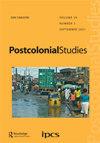Postcolonial intellectuals: new paradigms
IF 1.8
3区 社会学
Q2 CULTURAL STUDIES
引用次数: 7
Abstract
The figure of the intellectual has fascinated and mesmerized generations of thinkers, from Antonio Gramsci to Edward Said, from Michel Foucault to Gilles Deleuze, from Pierre Bourdieu to Jürgen Habermas, from Noam Chomsky to Cornel West, from Nancy Fraser to Gayatri Spivak, from Frantz Fanon to Stuart Hall, from Paul Gilroy to Rosi Braidotti, from Bruce Robbins to Helen Small and from Achille Mbembe to Judith Butler to mention but a few. The intellectual has also been studied from different disciplinary perspectives: political science, referring to the role of publicness and democratic influence; philosophy, concerning the question of truth and rhetoric; gender studies, concerning the divide between public and private and the visibility of feminist interventions; celebrity studies, concerning the role of charisma and stardom; (digital) media communication, concerning the role of new social media platforms and the authenticity, trust and accountability of news online; and postcolonial studies, concerning the question of individuality and collectivity in representing and speaking up for minorities, subalterns and marginalized groups. However, in my view postcolonial intellectuals are not only ‘spokespersons’, to avoid Jameson’s definition of the postcolonial intellectual as an ‘allegory of the third world’. On the contrary, my take on the postcolonial intellectual is to revisit, deconstruct and rethink the category of the intellectual not as universal, individualistic and autonomous but as embedded in collective discursive practices and political engagements. This special issue draws from a two-day international conference that was held at Utrecht University on 5–6 February 2019. The conference, entitled ‘Postcolonial Intellectuals and their European Publics’, was organized to help launch a large new European research network called PIN (Postcolonial Intellectuals in Europe) for which I was the PI. The network is funded by the Dutch Research Council (NWO) in collaboration with several European partners, including prominent centres, institutes and departments in postcolonial studies (among others, the University of Leeds, University of Warwick and Newcastle University in the UK; Utrecht University in the Netherlands; the University of Lisbon in Portugal; Ca’ Foscari University of Venice in Italy; Aalborg University in Denmark and INALCO in France).后殖民知识分子:新范式
知识分子的形象吸引了一代又一代的思想家,从安东尼奥·葛兰西到爱德华·萨义德,从米歇尔·福柯到吉尔·德勒兹,从皮埃尔·布迪厄到约尔根·哈贝马斯,从诺姆·乔姆斯基到康奈尔·韦斯特,从南希·弗雷泽到加亚特里·斯皮瓦克,从弗朗茨·法农到斯图尔特·霍尔,从保罗·吉尔罗伊到罗西·布莱多蒂,从布鲁斯·罗宾斯到海伦·斯莫尔,从阿奇利·姆本贝到朱迪思·巴特勒等等。知识分子也从不同的学科角度进行了研究:政治学,指的是公共性和民主影响的作用;哲学,关于真理和修辞的问题;性别研究,涉及公共和私人之间的鸿沟以及女权主义干预的可见性;名人研究,关于魅力和明星地位的作用;(数字)媒体传播,涉及新社交媒体平台的作用以及在线新闻的真实性、信任度和问责性;以及后殖民研究,涉及代表和为少数群体、次等群体和边缘群体发声的个性和集体问题。然而,在我看来,后殖民知识分子不仅仅是“代言人”,以避免詹姆逊将后殖民知识分子定义为“第三世界的寓言”。相反,我对后殖民知识分子的看法是重新审视、解构和重新思考知识分子的范畴,而不是作为普遍的、个人主义的和自主的,而是作为嵌入集体话语实践和政治参与的。本期特刊取材于2019年2月5日至6日在乌得勒支大学举行的为期两天的国际会议。这次会议的主题是“后殖民知识分子和他们的欧洲公众”,它的组织是为了帮助启动一个名为PIN(欧洲后殖民知识分子)的大型新欧洲研究网络,我是该网络的负责人。该网络由荷兰研究理事会(NWO)与几个欧洲伙伴合作资助,包括著名的后殖民研究中心、研究所和部门(其中包括英国的利兹大学、华威大学和纽卡斯尔大学;荷兰乌得勒支大学;葡萄牙里斯本大学;意大利威尼斯Ca ' Foscari大学;丹麦奥尔堡大学和法国国际非法协)。
本文章由计算机程序翻译,如有差异,请以英文原文为准。
求助全文
约1分钟内获得全文
求助全文

 求助内容:
求助内容: 应助结果提醒方式:
应助结果提醒方式:


